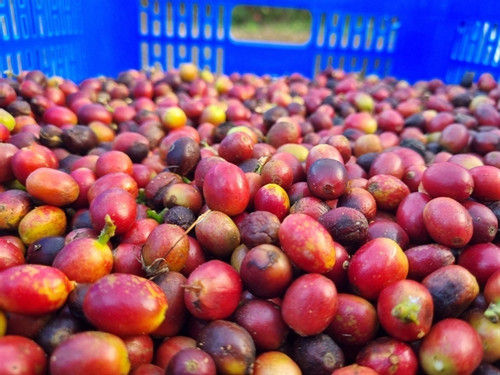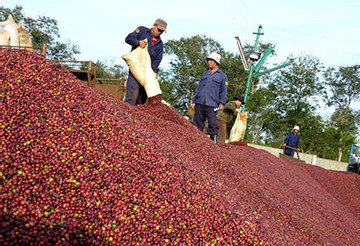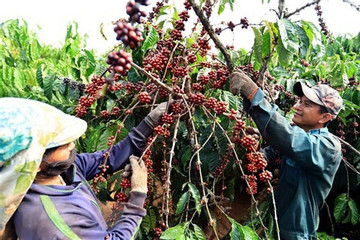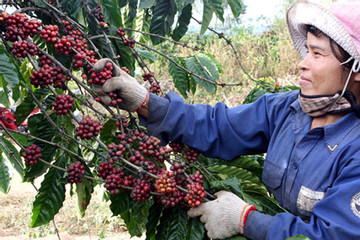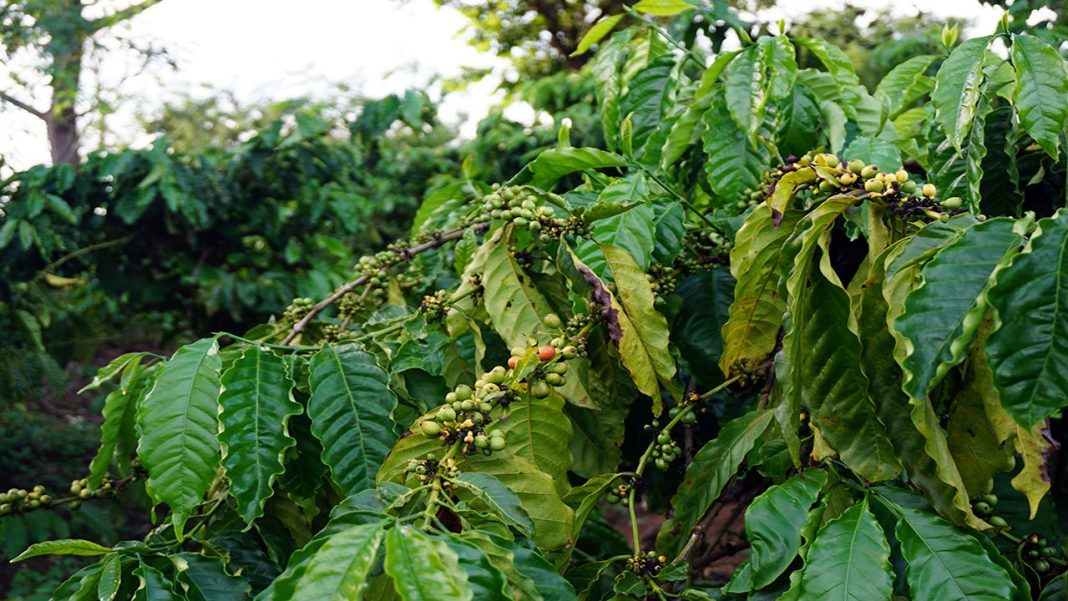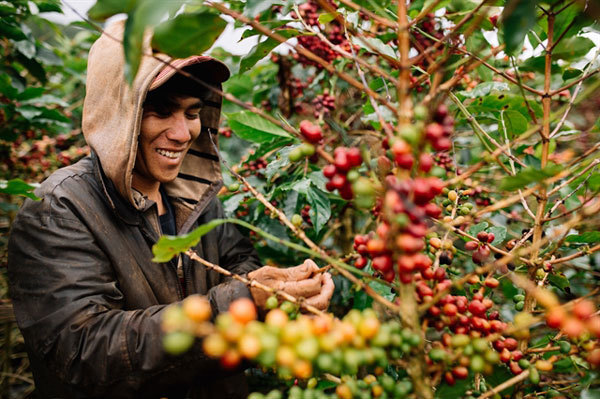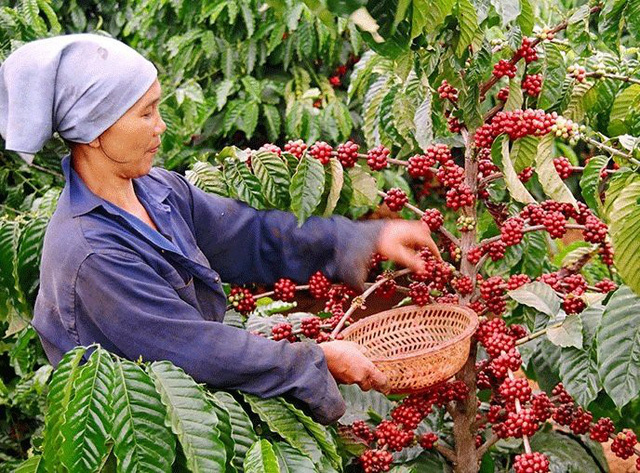- © Copyright of Vietnamnet Global.
- Tel: 024 3772 7988 Fax: (024) 37722734
- Email: evnn@vietnamnet.vn
coffee export
Update news coffee export
Việt Nam’s coffee export value doubles in January
A surge in domestic coffee prices was attributed to the fact that traders actively purchased coffee before the Lunar New Year (Tết) holiday while exporters were afraid of supply shortages like last year so they tended to buy more.
Coffee exports: bright spot for Vietnam agriculture in 2023
After great success in 2022, Vietnam's coffee exports may face challenges this year as the fluctuations of the US dollar have been unpredictable.
Vietnam's coffee export faces pressure from global uncertainties after record year
Vietnam exported 1.42 million tonnes of coffee in the first ten months of this year, a rise of 10.8 per cent over the same period last year.
Vietnamese coffee exports set a new record
Despite inflation and difficulties in trade, Vietnam's coffee exports recorded strong growth, according to experts, who expect a record US$4 billion in export value this year.
Vietnam becomes third largest coffee supplier to U.S.
Vietnam has become the third largest supplier of coffee to the U.S. over the first eight months of 2022, reported the General Department of Customs.
Can coffee supply of Vietnam satisfy Chinese demand?
As the second-largest coffee exporter in the world, Vietnam is more than well equipped to represent a major supplier of China’s current and future demand for coffee.
Vietnam urged to stir up coffee competition
Despite its large coffee output, Vietnam only gains little from global coffee markets as the country mainly exports raw materials. To make use of its many free trade deals, the country’s coffee maker will have to up their game.
US increases coffee imports from Vietnamese market
The market share of Vietnamese coffee as part of the United States’ total imports increased from 8.95% to 9.6% during the opening four months of the year, according to statistics compiled by the General Department of Vietnam Customs.
Some scenarios for coffee prices in 2022
Over the past two years, whilst the Covid-19 pandemic was raging over economies, coffee prices on both the derivatives market and domestic market have taken great strides.
Vietnam coffee industry targets US$6 billion export value in 2030
The Viet Nam Coffee and Cocoa Association has targeted a coffee export turnover of US$5-6 billion in 2030, doubling the export value at present.
Germany becomes biggest market for Vietnamese coffee
Coffee exports in the first nine months of this year decreased in volume but increased in turnover, with Germany being the largest market for the product.
Local coffee brands diversify operations to boost exports
Vietnamese producers continue to have a faint imprint on the world’s deep-processed coffee market, and many small businesses are now beginning to pay more attention to branding, while larger ones seek new ways to increase export output.
Vietnam becomes Japan’s biggest coffee supplier
Vietnam, the world's biggest producer of robusta, has become the top supplier of coffee beans for Japan as the consumption of instant coffee, which uses robusta, is soaring there amid the COVID-19 pandemic, according to the Nikkei Asia Review.
EVFTA obligations can brew up coffee success
Bolstered by the growing demand in the EU, Vietnam’s coffee industry has a major opportunity to capture a bigger market share on the European continent.
VN coffee growers warned of gloomy future
 Coffee prices have fallen dramatically, and some farmers are giving up because of problems because of price fluctuations and supply-demand imbalances.
Coffee prices have fallen dramatically, and some farmers are giving up because of problems because of price fluctuations and supply-demand imbalances.
VN coffee sector to expand intensive processing to add value
 Vietnam has set itself a target of increasing the ratio of processed coffee from the current 10 per cent to 30-40 per cent by 2030 to add value, the Viet Nam Coffee Week heard in HCM City on Wednesday.
Vietnam has set itself a target of increasing the ratio of processed coffee from the current 10 per cent to 30-40 per cent by 2030 to add value, the Viet Nam Coffee Week heard in HCM City on Wednesday.
Vietnam cannot earn big money from its coffee exports
 Vietnam, the second biggest coffee exporter in the world, is experiencing tough days as the export volume has fallen and export prices are among the lowest in the world.
Vietnam, the second biggest coffee exporter in the world, is experiencing tough days as the export volume has fallen and export prices are among the lowest in the world.
Vietnam’s premium beans exported abroad, while local coffee quality remains poor
VietNamNet Bridge - Vietnam exports nearly 2 million tons of high-quality coffee beans each year and imports 60,000 tons of processed coffee from Brazil, the US and China.
Vietnamese coffee sold at Starbucks shops & what’s next?
VietNamNet Bridge - Starbucks’ announcement to sell Vietnamese coffee at more than 21,500 shops in 56 countries is good news, but it also reveals weaknesses of the Vietnamese coffee industry.
BUSINESS IN BRIEF 22/12
SSC advises against making hasty invesments amidst market turmoil; Japan jumping into Hanoi real estate market; Mekong Delta rice output to reach 25.2 million tonnes; Vietnam business should be careful in Russia trade amid rouble crisis - economist
